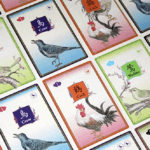 Our World
Our World  Our World
Our World  Pop Culture
Pop Culture 10 Evil Religions in Fiction
 Movies and TV
Movies and TV 10 Wild Facts About the Making of Popular Westerns
 Weird Stuff
Weird Stuff 10 Recent Newsworthy Hallucinations
 Miscellaneous
Miscellaneous 10 Strange Things Science Has Taught Us About Our Preferences
 Health
Health 10 Medical Conditions Named After Mythical Creatures
 Space
Space 10 Mind-Blowing Discoveries for Life on Mars
 Miscellaneous
Miscellaneous The 10 Toughest English Language Words to Pronounce
 Creepy
Creepy Ten Formidable Bugs and Insects That Scientists Recently Discovered
 Humans
Humans 10 Things Humans Are Weirdly Bad at Predicting
 Our World
Our World 10 Invisible Standards That Make the Modern World Work
 Pop Culture
Pop Culture 10 Evil Religions in Fiction
 Movies and TV
Movies and TV 10 Wild Facts About the Making of Popular Westerns
Who's Behind Listverse?

Jamie Frater
Head Editor
Jamie founded Listverse due to an insatiable desire to share fascinating, obscure, and bizarre facts. He has been a guest speaker on numerous national radio and television stations and is a five time published author.
More About Us Weird Stuff
Weird Stuff 10 Recent Newsworthy Hallucinations
 Miscellaneous
Miscellaneous 10 Strange Things Science Has Taught Us About Our Preferences
 Health
Health 10 Medical Conditions Named After Mythical Creatures
 Space
Space 10 Mind-Blowing Discoveries for Life on Mars
 Miscellaneous
Miscellaneous The 10 Toughest English Language Words to Pronounce
 Creepy
Creepy Ten Formidable Bugs and Insects That Scientists Recently Discovered
 Humans
Humans 10 Things Humans Are Weirdly Bad at Predicting
Top 10 Olympic Games Firsts
With the London Olympics starting in about 10 hours, the five rings are jangling wildly in excitement. Every four years since 1896, the Olympic have gone on without fail, unsnuffed like the flame of that symbolic torch. Even amidst wars, civil rights tension, and various individual tragedies, the games have championed on, continuing to showcase the fittest our countries have to offer, and the fittest countries over all. For those overwhelmed by more pressing matters than javelins and pole vaults and relay races, these determined athletes provide a great source of inspiration and hope. But we didn’t always have such failsafe outlet in which to instill our pride. It, just like the human race, has come along way since its original inception. Here are ten Olympic firsts.

The first recorded games occurred in Olympia, Greece in 776 B.C. (they could have occurred earlier, but no other written record can account for anything otherwise). This was back in the Greece’s polytheistic days, where in which the games were held in honor of Zeus and also as test of human greatness. The ancient games were much different than today’s games as they were played only amongst the Greeks, mostly men. Also there were much fewer games–including pentathlons, running, wrestling, boxing, and myriad horse-riding events–and much more sacrificial slaughters of oxen. These paganistic games eventually came to a halt by a Christianity-imposing Thedosius I in 394 A.D.
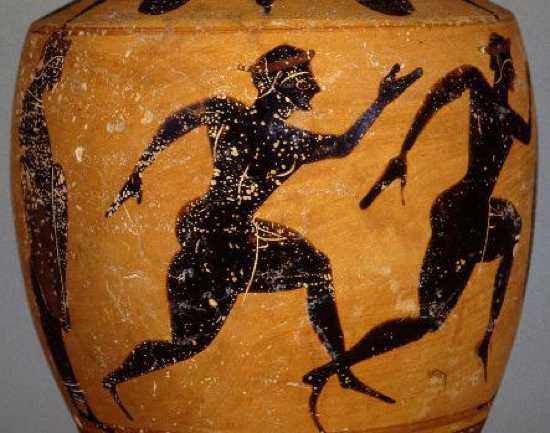
The first recorded Olympic champion was a nudist (the ancient games were often performed in the nude) and a runner, who won the only event at the time, the “stade” (a greek measurement–about 600 feet or 180 meters). This nude victor was a cook from the city of Elis named Coroebus.
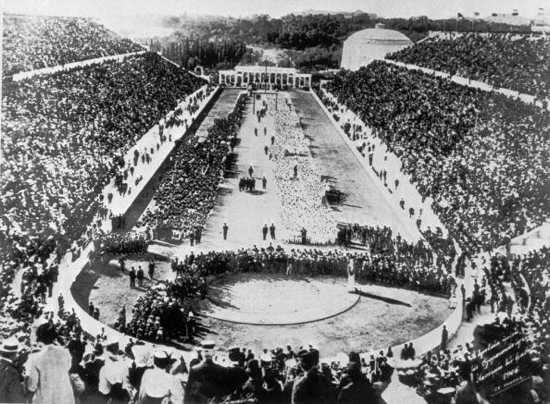
The first modern games were held in 1896 in Athens, Greece, kicking off with a hundred-meter dash as the first event. The first champion was named James Brendan Connolly of the U.S., who won the triple jump (the last game of the first modern Olympics). Another ‘first’ happened during these games as well; the first brothers to win gold medals: John and Sumner Paine of the U.S. won the military pistol and free pistol shooting events, respectively. Yes, those were actual events, and what a better show of 2nd Amendment pride.
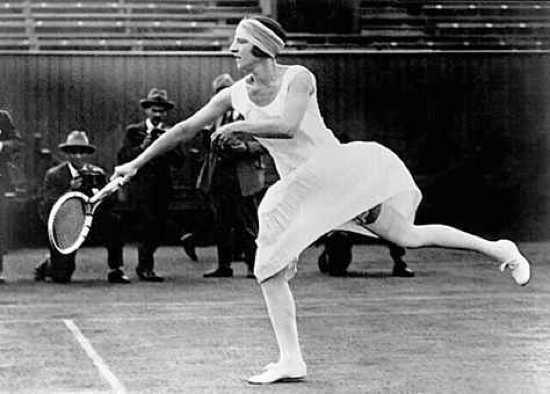
Women first competed in the modern games in the 1900 Olympics held in Paris, but there is documentation suggesting a woman named Bilistiche competed (and even triumphed) in the ancient games. During the 1900 games, however, the first female champion was Charlotte Cooper of England, who won the tennis singles. The first woman to compete and the first woman to win a gold medal in the modern Olympics was Swiss sailor Hélène de Pourtalès, a member of a boating crew.
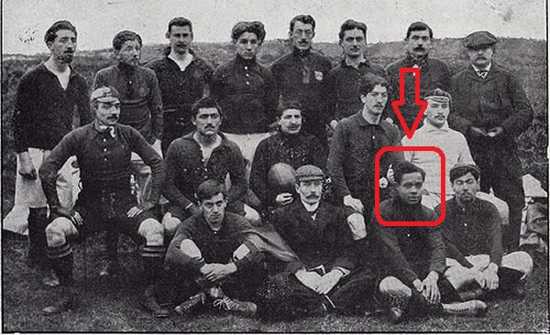
Another first in the 1900 Olympics occurred in the first black competitor, Constantin Henriquez de Zubieta of France. The first to win, however, was not until 8 years later, in the form of John Taylor, who was on the U.S. relay team. Additionally the first black African (from Ethiopia) to win gold was Abebe Akila, in the 1960 games in Rome, running a marathon. He also did it completely barefoot.
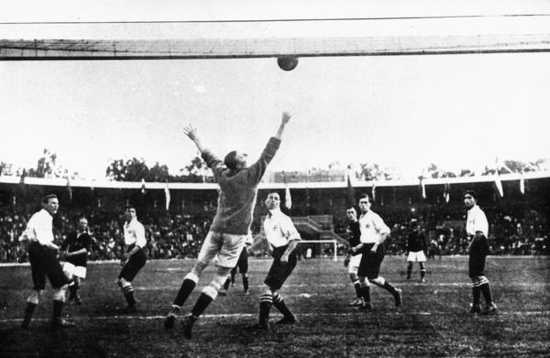
The first team sport was added in 1900; the game being football (a.k.a. soccer, which isn’t to be confused with ‘American football’). A fitting sport, as it is one of the few sports outside of the olympics that is actually played on an international level–every U.S. sport (aside from hockey) kept strictly within domestic borders. In the first game, England, France, and Belgium won gold, silver, and bronze respectively.

Because you can’t properly cheer for the home team without the help of a man shamelessly dressed in a giant, plushy animal costume (or, for that matter, an animal shamelessly dressed in a plushy man costume), the first mascot was introduced into the Olympics during the 1972 Munich games; his name was Waldi the dachshund. Waldi, depicted in cartoon form, was a blue wiener-dog that appeared to be wearing a rainbow-colored sweater. No more potent image of united diversity exists (except maybe a picture of the U.N.).
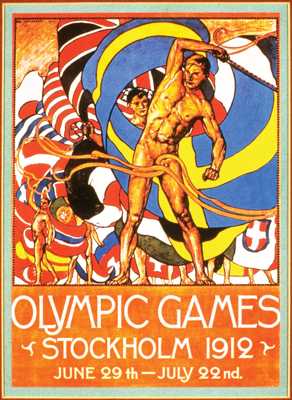
This happened in the 1912 Stockholm, Sweden games, when Japan joined as the first Asian country to participate. Also occurring during this game was the first Olympic-related death; after running 29 kilometers, Francisco Lazaro collapsed due to sunstroke and heart problems, dying the next day.
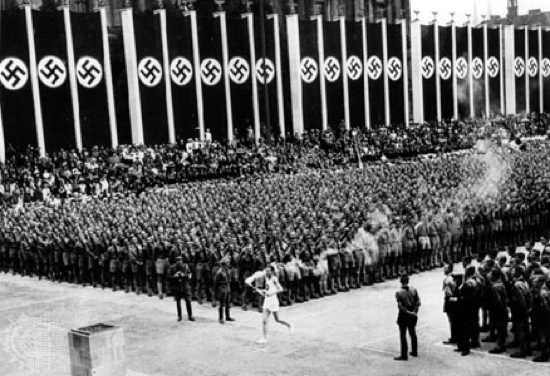
The 1936 Berlin Olympics were the first to be televised, displayed on giant screens all over Berlin. England was the first to have the games broadcast into its homes when the 1948 London Olympics were televised. And the first game to be broadcast into homes internationally was during the 1960 Rome Olympics. It is only through advances in television that onlookers can watch the games from around the world with an immediate sense of national pride, the significance of such feats of strength reduced otherwise to simply taking someone’s word for it.
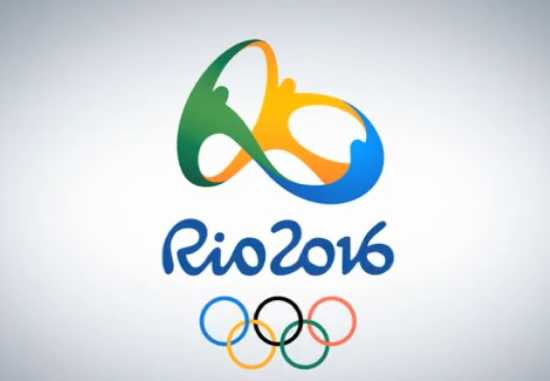
Granted this “Olympic first” has not happened yet, it will most definitely when Rio De Janeiro, Brazil hosts the summer games in 2016. This was announced by the International Olympic Committee back in 2009 in Denmark. Amongst the 28 sports to be incorporated in the 2016 games are rugby and (get this) golf. And thus both ends of the athletic spectrum shall touch (and Tiger Woods will become an “Olympic athlete,” so to speak). Next to come (most likely): tanning contests. At least that’d be more exciting to watch.





